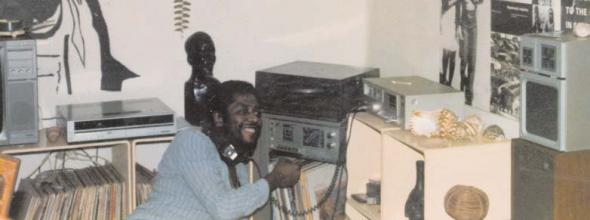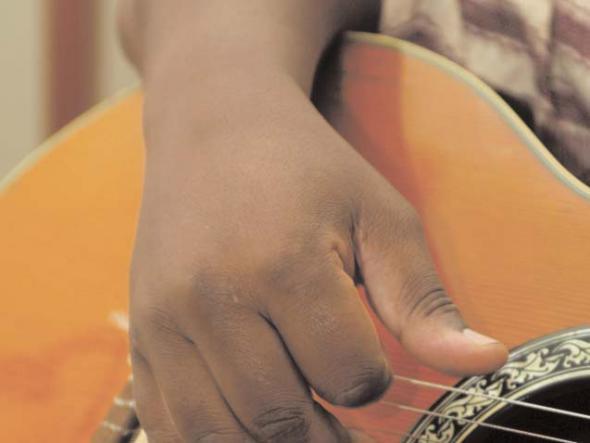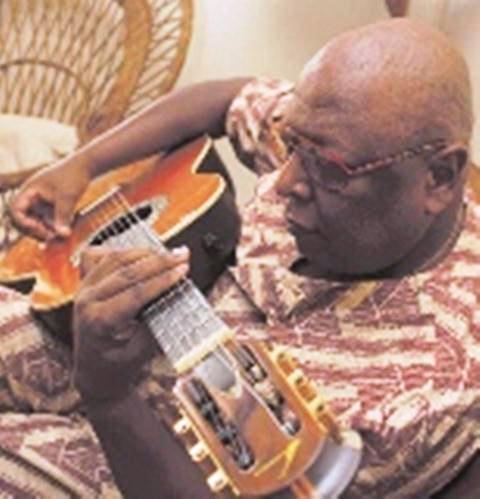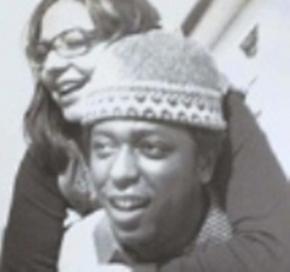To the sound of the old pick-up
The saucepan lids turned like records on an imaginary pick-up. If you closed your eyes, you could hear the sounds reverberating everywhere. Then came the sessions when other rhythms were played - mornas and coladeras on the guitar of a cousin who “sort of lived in the house.” The gramophones and the radios had also been sort of living there for a long time. But that was at the start. Aftyer that there was going to be the Clube Marítimo Africano, the final year parties, the focus on a big new star and then recognition as a major figure in Angolan music: Filipe Zau.
Lisbon, 11 Rua José Ricardo. At six month old, little Filipe Silvino de Pina Zau moved into the house where he would live until he was 17. It was here that the path of destiny was paved for him: he was to be a musician. He was born in the Portuguese capital on 2 November 1950 and the rhythm from the waves of his father’s travels coursed through his veins. His father was Angolan, from Cabinda, and a seaman by profession. His feel for music also came from his mother, who was from Ponta Verde in Fogo, an island in Cape Verde rising atop a gigantic volcano. This was a land of mysteries.
He was an only son, and lived in a house with his parents and another couple who were cousins. His was a life always surrounded by music from the equipment that filled the apartment. The first one was a wind-up variety, “one of the really old ones”. Then there was a small German pick-up, produced by Lowe Opta, sending out music which frequently enlivened the boisterous parties in the Clube Marítimo Africano. It was at these seafarers’ revelries that Filipe, at around 7 years old, learnt to choose and play music. But it was only when a new gramophone arrived at the house, this time a Telefunken, that he discovered his real vocation. He has free use of the equipment for months at a time, while the men of the household were out on the high seas. His world turned in the same circle as the 33s, 45s and 78s – nearly 400 of them – that filled his family’s record collection. Whenever his father and cousin returned “they came with new records, that they had bought in the ports where they docked around the world,” as he recalls today.

By this time, the saucepans lids he used to imitate the records going round were just a memory. He still remembers music from around the world that he heard at that time: the merengues of Luís Kalaff anb Angel Vilória and their “Alegres Dominicanos”; boleros featuring António Machin, Juan Serrano and the Sonora Matancera; rumbas with Célia Cruz; the cha-cha-cha of Tito Puente; Carlos Gardel’s tangos; Carmen Miranda and Ângela Maria sambas: and later the romantic tunes of the Italian Marino Marini and the Argentinean Alberto Cortez.
This kind of immersion in music had to be more than saucepans. When Filpe was 12, he learnt his first guitar chords with a Cape Verde cousin who could pick out mornas and Creole coladeras. But it was in the 60s, when he was 15, that his musical career officially began, in a final year party for school in Lisbon. He played the drums for the “Logos Quintetus” group, where he was later to become the singer. They say that the rhythms from this decade changed the world, and they certainly had their effect on Filipe. Because he was used to hearing a bit of everything, the young pupil at the Gil Vicente Grammar School hewed his talent from a range of sounds: the hallucinogenic guitar of Jimmy Hendrix, rock from the Rolling Stones, pop from the Beatles, blues, soul, the French music of Françoise Hardi and Silvie Vartin and the music of Franco. He dates his first composition from this point: “it had three chords and lyrics in French. I don’t remember showing it to anybody.”

From that point on, there was no stopping him. Up to 1970 he played in a number of student bands at final year parties and in community halls. His repertoire covered all the pop hits of the time. Two years later and he was the drummer of “Blackground”, a group connected to the Duo Ouro Negro. Between 1972 and 1974 he had a part in records made by the Portuguese musicians such as Sérgio Godinho, Vitorino and Fausto, and by the Cape Verde musicians Bana and Luís Morais. Along the way he took part in the 10th Portuguese Song Contest. Yet even with all this going on, he managed to finish his course as a primary teacher.
For the next two years he played in “Baga-Baga”, the group directed by Rão Kyao, and made his first single with two of his own songs, Fases de Revolta and Revolução Guerrilheira. These were the early signs of his work as a political song-writer, which came to the fore after Angolan independence. Among the songs that were milestones in his career and landmarks of the times were Pioneiro Pedrito, O fantoche, Domingas Kanhari, Mulher do meu Povo and África Revolução.
By 1977 he was living in Luanda and his life took on added momentum. He put time aside for professional training in Angola, Germany and Brazil, but he also found time to make his second single, Congresso and he won the first national Music Contest award. He represented Angola in the 11th Festival for Youngsters and Students in Cuba, he composed practically all the songs for the musical “África Liberdade” and a number of children’s songs for the Rádio Piô and Carrossel programmes on Rádio Nacional de Angola.
This high-powered productivity came to halt in 1984 when he journeyed to Brazil for a teaching course in the Centro de Ensino Unificado de Brasília. Music, however, called him insistently and he couldn’t resist. He enrolled in the capital’s music academy, the Escola de Música. During 1988, the last year of his studies, he founded the group Tukayana, made up of students and teachers of the school. They toured the country, playing exclusively Angolan music, taking in Brasília, Rio de Janeiro, São Paulo and Mato do Grosso do Sul.
 The next few years were spent in Angola and in Portugal, where he got another degree in teaching. During this period he was highly productive. 1996 was frenetic, with the launch of his first CD Luanda, Lua e Mulher and then the double CD Canto da Sereia – o Encanto. This was undertaken with Filipe Mukenga and represented Angola in Expo 98 in Portugal. In 1996he also published his first book of poetry Encanto de um mar que eu canto, his first journey into the daunting world of literature. Between 2002 and 2005 he published Angola: Trilhos para o Desenvolvimento, Marítimos Africanos and Um Clube com História and the book of poetry Meu Canto à Razão e à Quimera das Circunstâncias.published by Chá de Caxinde in Angola and Prefácio in Portugal.
The next few years were spent in Angola and in Portugal, where he got another degree in teaching. During this period he was highly productive. 1996 was frenetic, with the launch of his first CD Luanda, Lua e Mulher and then the double CD Canto da Sereia – o Encanto. This was undertaken with Filipe Mukenga and represented Angola in Expo 98 in Portugal. In 1996he also published his first book of poetry Encanto de um mar que eu canto, his first journey into the daunting world of literature. Between 2002 and 2005 he published Angola: Trilhos para o Desenvolvimento, Marítimos Africanos and Um Clube com História and the book of poetry Meu Canto à Razão e à Quimera das Circunstâncias.published by Chá de Caxinde in Angola and Prefácio in Portugal.
He is a self-confessed academic (with an MA in Inter-Cultural relations and a PhD in Education, both awarded by the Universidade Aberta, in Lisbon). He has given addresses in conferences on education in various countries in Europe and the Americas, but this intellectual activity has never stopped him from being an out-and-out musician. His music, in fact, has brought him recognition inside Angola and beyond. In 2000, for instance, in the Coliseu dos Recreios in Lisbon, he was given an award as “the best African composer in the Portuguese language.”
 He now lives definitely in Luanda with his wife Lykas, and music is still one of his main activities. He works with Filipe Mukenga, Rui Mingas, Paulo Flores, Eduardo Paim, Mário R. Silva, and the Cape Verde musician Celina Pereira, along with many others. New stars in Angolan music, such as Maya Cool and Pati Faria, also sing his songs. The roots of his music go down deep back to the time when he found his own special music in the saucepan lids. And the work that this led to has cemented the position of Filipe Zau as one of Angola’s greatest musicians.
He now lives definitely in Luanda with his wife Lykas, and music is still one of his main activities. He works with Filipe Mukenga, Rui Mingas, Paulo Flores, Eduardo Paim, Mário R. Silva, and the Cape Verde musician Celina Pereira, along with many others. New stars in Angolan music, such as Maya Cool and Pati Faria, also sing his songs. The roots of his music go down deep back to the time when he found his own special music in the saucepan lids. And the work that this led to has cemented the position of Filipe Zau as one of Angola’s greatest musicians.
photos by Carlos Lousada and Filipe Zau archive
in AUSTRAL nº 64, article gently given by TAAG Magazine- Angola Airlines